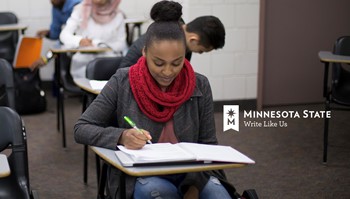Write Like Us began as an equity-based creative writing program at five Twin Cities metro-area community colleges: Anoka-Ramsey Community College, Century College, Minneapolis Community and Technical College, Normandale Community College, and North Hennepin Community College. Write Like Us centers and celebrates the work of BIPOC writers and writing students, fostering literary mentorship and leadership as it builds a platform for shared stories, voices, and lived experiences.
Past Events
Edwidge Danticat, March, 19 2024.
From 2024 announcement:
Danticat is the Wun Tsun Tam Mellon Professor of the Humanities in the Department of African American and African Diaspora Studies at Columbia University. She received her B.A. in French Literature from Barnard College and her Master of Fine Arts in Creative Writing from Brown University.
She is the author of seventeen books, including Breath, Eyes, Memory, an Oprah Book Club selection, Krik? Krak!, a National Book Award finalist, The Farming of Bones, an American Book Award winner; the novels-in-stories, The Dew Breaker, Claire of the Sea Light, and The Art of Death, a National Book Critics Circle finalist for Criticism. She has written seven books for children and young adults, a travel narrative, After the Dance, and a collection of essays, Create Dangerously. Her memoir, Brother, I'm Dying, was a 2007 finalist for the National Book Award and a 2008 winner of the National Book Critics Circle Award for autobiography. She is the editor of The Butterfly's Way: Voices from the Haitian Dyaspora in the United States, The Beacon Best of 2000, Haiti Noir, Haiti Noir 2, and Best American Essays 2011.
She is a 2009 MacArthur Fellow, a 2018 Ford Foundation Art of Change Fellow, a 2018 winner of the Neustadt Prize, a 2019 winner of the Saint Louis Literary Award, a 2020 United States Artist Fellow, a 2020 winner of the Vilceck Prize, and a 2023 winner of the PEN/Malamud Award for Excellence in the Short Story. Her story collection, Everything Inside, was a 2020 winner of the Bocas Fiction Prize, The Story Prize, and the National Book Critics Circle Fiction Prize. Her essay collection We’re Alone is forthcoming from Graywolf Press in Fall 2024.

